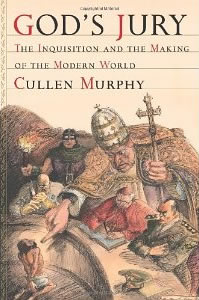Book Notes
 Cullen Murphy, God's Jury; The Inquisition and the Making of the Modern World (New York: Houghton Mifflin Harcourt, 2012), 310pp.
Cullen Murphy, God's Jury; The Inquisition and the Making of the Modern World (New York: Houghton Mifflin Harcourt, 2012), 310pp.
Today it goes by the name Congregation for the Doctrine of the Faith, but for 700 years, until 1908, it was known as "The Congregation of the Inquisition." The secrecy, the policing of the faithful, and the bureaucratism continue under a new name today, but give credit where it's due. In 1998, none other than Joseph Ratzinger opened the 35,000 volumes of the Inquisition archives to scholars. Murphy's book is one of many that have benefitted from this new level of access and scrutiny.
The Medieval Inquisition began in 1231 when Pope Gregory IX established "inquisitors of heretical depravity" as papal agents. At the time, that meant primarily the Cathars in southern France. King Ferdinand of Aragon and Queen Isabella of Castile merged the power of throne and altar in what we know as the Spanish Inquisition of the late fifteenth century. Established in 1542, it featured the Index of Forbidden Books, the expulsion of Jews, and the Inquisitor General Tomas de Torquemada. It's last execution took place in 1826. The Roman Inquisition of the sixteenth century targeted Protestants and is infamous for the trial of Galileo. When Spain and Portugal conquered lands in the new world, they exported the Inquisition there, too, to Mexico City, Lima, Manila, Catagena, Goa in India, and Santa Fe in what became America. Today the CDF still has weekly meetings.
Murphy argues that the Inquisition is not a bygone relic of an irrational pre-modernity. In his view, the "inquisitorial impulse" lives on in many secular counterparts — Italian fascism, the French Revolution, Germany's Third Reich, East Germany's stasi, Russia's gulags, Britain's four million closed circuit televisions, J. Edgar Hoover's files on 25 million Americans (1 out of 8 citizens), and torture at Guantanamo. Such "recurring behavior" results from "unswerving confidence in the rightness of one's cause," and is enabled by bureaucracy, communications, surveillance, and censorship. So, yes, there's much to lament in the Catholic Inquisitions, but "inquisitions of various kinds are a recurring and inescapable feature of modern life. Inquisitions advance hand-in-hand with civilization itself."


